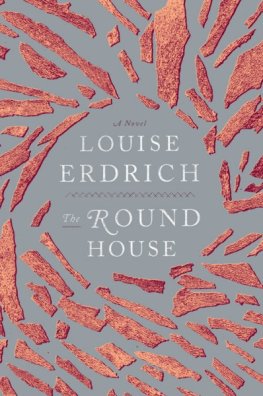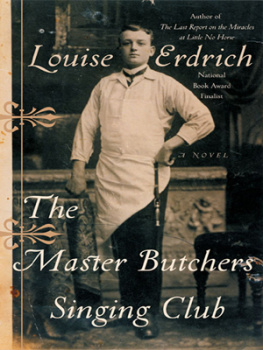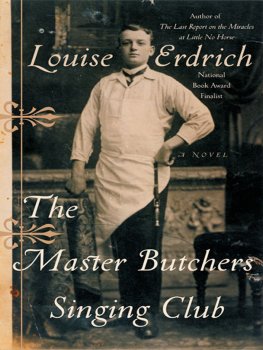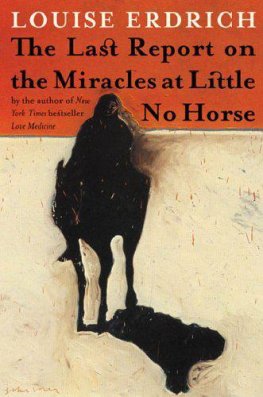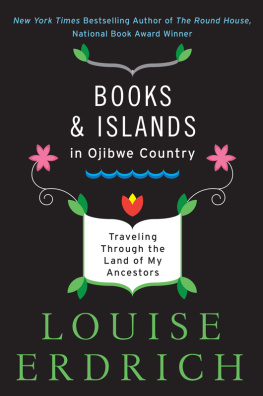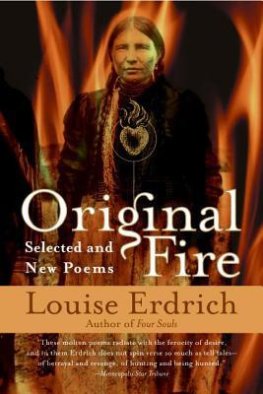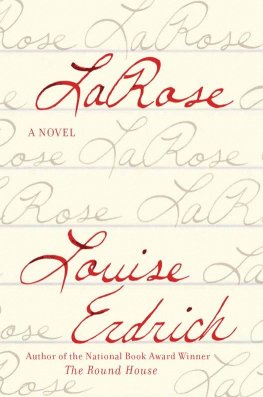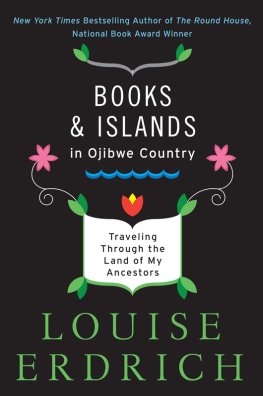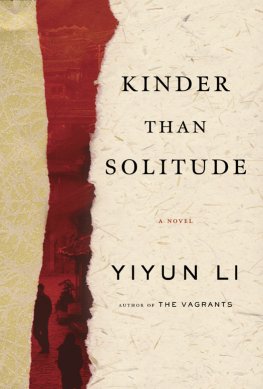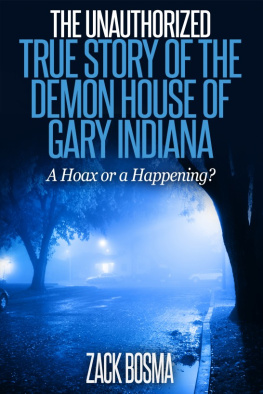The Round House
by Louise Erdrich
Small trees had attacked my parents house at the foundation. They were just seedlings with one or two rigid, healthy leaves. Nevertheless, the stalky shoots had managed to squeeze through knife cracks in the decorative brown shingles covering the cement blocks. They had grown into the unseen wall and it was difficult to pry them loose. My father wiped his palm across his forehead and damned their toughness. I was using a rusted old dandelion fork with a splintered handle; he wielded a long, slim iron fireplace poker that was probably doing more harm than good. As my father prodded away blindly at the places where he sensed roots might have penetrated, he was surely making convenient holes in the mortar for next years seedlings.
Whenever I succeeded in working loose a tiny tree, I placed it like a trophy beside me on the narrow sidewalk that surrounded the house. There were ash shoots, elm, maple, box elder, even a good-sized catalpa, which my father placed in an ice cream bucket and watered, thinking that he might find a place to replant it. I thought it was a wonder the treelets had persisted through a North Dakota winter. Theyd had water perhaps, but only feeble light and a few crumbs of earth. Yet each seed had managed to sink the hasp of a root deep and a probing tendril outward.
My father stood, stretching his sore back. Thats enough, he said, though he was usually a perfectionist.
I was unwilling to stop, however, and after he went into the house to phone my mother, who had gone to her office to pick up a file, I continued to pry at the hidden rootlings. He did not come back out and I thought he must have lain down for a nap, as he did now sometimes. You would think then that I would have stopped, a thirteen-year-old boy with better things to do, but on the contrary. As the afternoon passed and everything on the reservation grew quiet and hushed, it seemed increasingly important to me that each one of these invaders be removed down to the very tip of the root, where all the vital growth was concentrated. And it seemed important as well that I do a meticulous job, as opposed to so many of my shoddily completed chores. Even now, I wonder at the steepness of my focus. I wedged my iron fork close as I could along the length of the twiglike sprout. Each little tree required its own singular strategy. It was almost impossible not to break off the plant before its roots could be drawn intact from their stubborn hiding place.
I quit at last, sneaked inside, and slipped into my fathers study. I took out the law book my father called The Bible. Felix S. Cohens Handbook of Federal Indian Law. It had been given to my father by his father; the rust red binding was scraped, the long spine cracked, and every page bore handwritten comments. I was trying to get used to the old-fashioned language and constant footnotes. Either my father or my grandfather had placed an exclamation point on page 38, beside the italicized case, which had naturally interested me also: United States v. Forty-three Gallons of Whiskey. I suppose one of them had thought that title was ridiculous, as I did. Nevertheless, I was parsing out the idea, established in other cases and reinforced in this one, that our treaties with the government were like treaties with foreign nations. That the grandeur and power my Mooshum talked about wasnt entirely lost, as it was, at least to some degree I meant to know, still protected by the law.
I was reading and drinking a glass of cool water in the kitchen when my father came out of his nap and entered, disoriented and yawning. For all its importance Cohens Handbook was not a heavy book and when he appeared I drew it quickly onto my lap, under the table. My father licked his dry lips and cast about, searching for the smell of food perhaps, the sound of pots or the clinking of glasses, or footsteps. What he said then surprised me, although on the face of it his words seem slight.
Where is your mother?
His voice was hoarse and dry. I slid the book on to another chair, rose, and handed him my glass of water. He gulped it down. He didnt say those words again, but the two of us stared at each other in a way that struck me somehow as adult, as though he knew that by reading his law book I had inserted myself into his world. His look persisted until I dropped my eyes. I had actually just turned thirteen. Two weeks ago, Id been twelve.
At work? I said, to break his gaze. I had assumed that he knew where she was, that hed got the information when he phoned. I knew she was not really at work. She had answered a telephone call and then told me that she was going in to her office to pick up a folder or two. A tribal enrollment specialist, she was probably mulling over some petition shed been handed. She was the head of a department of one. It was a Sundaythus the hush. The Sunday afternoon suspension. Even if shed gone to her sister Clemences house to visit afterward, Mom would have returned by now to start dinner. We both knew that. Women dont realize how much store men set on the regularity of their habits. We absorb their comings and goings into our bodies, their rhythms into our bones. Our pulse is set to theirs, and as always on a weekend afternoon we were waiting for my mother to start us ticking away on the evening.
And so, you see, her absence stopped time.
What should we do, we both said at once, which was again upsetting. But at least my father, seeing me unnerved, took charge.
Lets go find her, he said. And even then as I threw on my jacket, I was glad that he was so definitefind her, not just look for her, not search. We would go out and find her.
The cars had a flat, he declared. She probably drove someone home and the cars had a flat. These damn roads. Well walk down and borrow your uncles car and go find her.
Find her, again. I strode along beside him. He was quick and still powerful once he got going.
He had become a lawyer, then a judge, and also married late in life. I was a surprise to my mother, too. My old Mooshum called me Oops; that was his nickname for me, and unfortunately others in the family found it funny. So I am sometimes called Oops to this very day. We went down the hill to my aunt and uncles housea pale green HUD house sheltered by cottonwood and gentrified by three small blue spruce trees. Mooshum lived there too, in a timeless fog. We were all proud of his superlongevity. He was ancient, but still active in the upkeep of the yard. Each day, after his exertions outside, he lay by the window on a cot to rest, a pile of sticks, lightly dozing, sometimes emitting a dry, sputtering sound that was probably laughter.
When my father told Clemence and Edward that my mother had had a flat and we needed their car, as if he actually had knowledge of this mythical flat tire, I almost laughed. He seemed to have convinced himself of the truth of his speculation.
We backed down the gravel drive in my uncles Chevrolet and drove to the tribal offices. Circled the parking lot. Empty. Windows dark. As we came back out the entrance, we turned right.
She went to Hoopdance, Ill bet, said my father. Needed something for dinner. Maybe she was going to surprise us, Joe.
I am the second Antone Bazil Coutts, but Id fight anyone who put a junior in back of my name. Or a number. Or called me Bazil. Id decided I was Joe when I was six. When I was eight, I realized that Id chosen the name of my great-grandfather, Joseph. I knew him mainly as the author of inscriptions in books with amber pages and dry leather bindings. Hed passed down several shelves of these antiquities. I resented the fact that I didnt have a brand-new name to distinguish me from the tedious Coutts lineresponsible, upright, even offhandedly heroic men who drank quietly, smoked an occasional cigar, drove a sensible car, and only showed their mettle by marrying smarter women. I saw myself as different, though I didnt know how yet. Even then, tamping down my anxiety as we went looking for my mother, who had gone to the grocery storejust that, surely, a little errandI was aware that what was happening was in the nature of something unusual. A missing mother. A thing that didnt happen to the son of a judge, even one who lived on a reservation. In a vague way, I hoped

